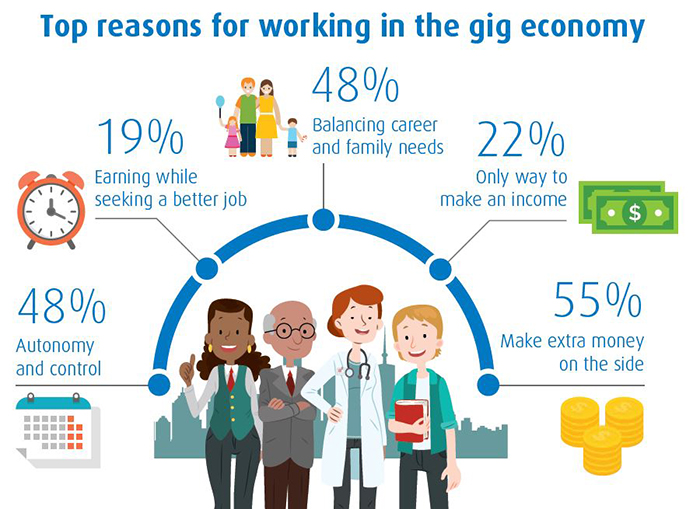What is the gig economy?
If you have ever signed up to drive or use an Uber, Bolt or any app based taxi service then you have certainly taken part in this new transformation in the world of work known as the gig economy. The gig market or economy, peer to peer economy or platform economy all refer to a free market system where workers are engaged on temporary assignments usually called a gig. These workers could be freelancers, part-time hires, project-based workers or temporary workers. The most popular gig platforms include freelance platforms like Upwork, People per Hour and Fiverr. Others can be found in the delivery and transportation services such as Uber, Bolt and Deliveroo. In Africa, similar platforms include Cedijobs, Freelance Cape Town, NoSweat and Yango.
Interesting growth figures by the gig economy
Over the last decade, this market has seen remarkable growth. This has been largely due to an increase in technology that helps workers transact directly with clients and the shrinking of the traditional job market. Uber recorded 3.9 million drivers worldwide in December 2019 with 150,000 in Africa. In a study by the biggest freelance platform in America, freelancers in America increased by 4 million to reach 57 million between 2014 and 2019. Part of the effect of COVID-19 on work is that it has led to an increase in the demand for temporary and part-time hires. Restrictions in movement coupled with the slowing down of economic activities will very much likely lead to more workers and employers turning to the gig economy to manage the current situation.
The upsides of the gig economy
Earning money while working in the comfort of your home at your own convenient time without the stress of commute for most people is the most attractive feature of the gig economy. Others are sold on the the gig economy because it offers very flexible work arrangements which allows for all classes of workers to take part. These can include retirees, professionals with full-time jobs and low skilled workers. Being a gig worker allows you to choose what projects to work on and allows you to build a varied skill set in the process. Also most workers are happy to be able to have work life balance when they choose to work in the gig economy.
The not so great sides of the gig economy
The future of work lies in flexible work patterns, however the gig economy has often offered these flexible work options at the expense of workers’ rights and protections. Gig workers are often classified as independent contractors who do not qualify for benefits such as pensions, employer withholding taxes, paid leaves, health insurance and other benefits usually enjoyed by full-time employees who may be performing the same tasks.
Also, workers that rely on this form of work for their livelihoods have little to no job security or income security. They face intense pressure to accept whatever gigs that come their way even in undesirable conditions and wage rates.
Protecting the rights of workers on gig platforms
To address the shortcomings of the gig economy, some gig platforms such as Uber have been sued in some countries whiles other states have passed legislation to ensure that lower skilled workers especially are properly classified to protect their rights. The other good news is that some gig platforms have started putting measures in place that can protect workers on their platform. LeadGenius, a company that aims to provide better work conditions for gig workers on its platform ensures that workers receive hourly wages above the minimum wage and have access to growth opportunities that can land them a full-time employee status within the company.
As the gig economy evolves to meet labour rights and protections requirements, it can become a very good means for workers and employers to create work arrangements that fit the current economic and social realities facing the world of work today.



Great one there Debbie! Having a balance of the gig economy and the normal working routine I think would help a lot.
LikeLike
Thanks, Solomon! Glad you enjoyed it. Definitely, a balance of the two would be great. Let’s see how it will play out especially post COVID-19.
LikeLike